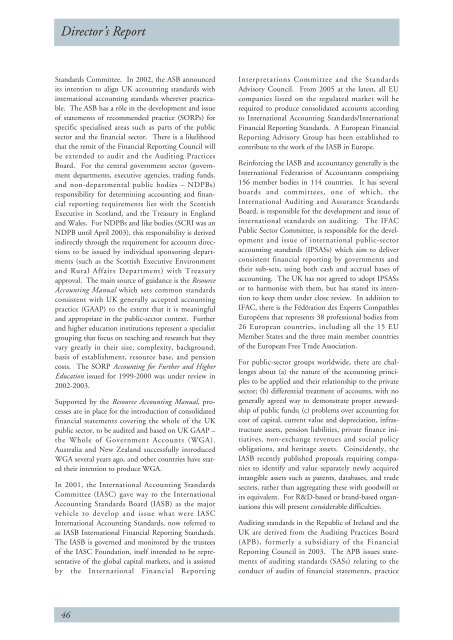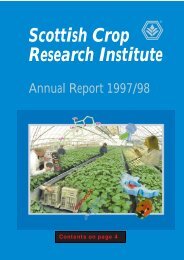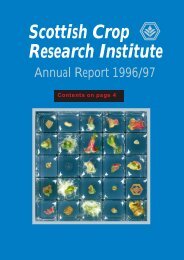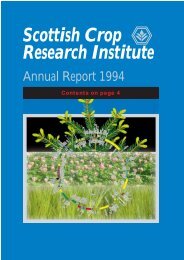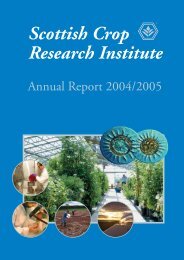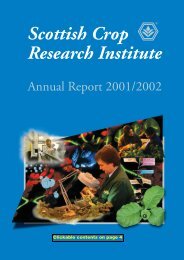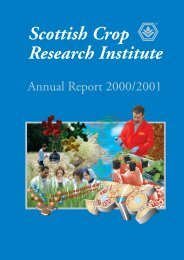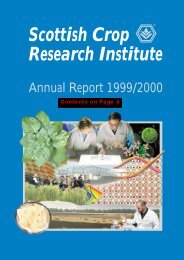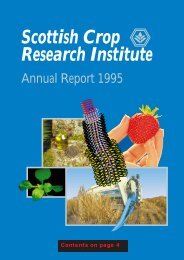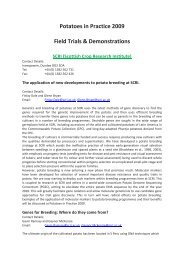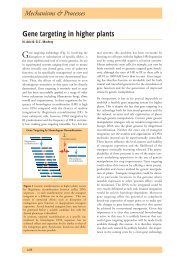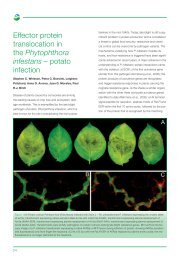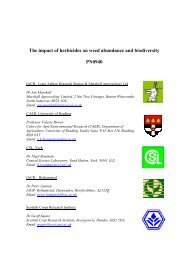PDF file: Annual Report 2002/2003 - Scottish Crop Research Institute
PDF file: Annual Report 2002/2003 - Scottish Crop Research Institute
PDF file: Annual Report 2002/2003 - Scottish Crop Research Institute
You also want an ePaper? Increase the reach of your titles
YUMPU automatically turns print PDFs into web optimized ePapers that Google loves.
Director’s <strong>Report</strong><br />
Standards Committee. In <strong>2002</strong>, the ASB announced<br />
its intention to align UK accounting standards with<br />
international accounting standards wherever practicable.<br />
The ASB has a rôle in the development and issue<br />
of statements of recommended practice (SORPs) for<br />
specific specialised areas such as parts of the public<br />
sector and the financial sector. There is a likelihood<br />
that the remit of the Financial <strong>Report</strong>ing Council will<br />
be extended to audit and the Auditing Practices<br />
Board. For the central government sector (government<br />
departments, executive agencies, trading funds,<br />
and non-departmental public bodies – NDPBs)<br />
responsibility for determining accounting and financial<br />
reporting requirements lies with the <strong>Scottish</strong><br />
Executive in Scotland, and the Treasury in England<br />
and Wales. For NDPBs and like bodies (SCRI was an<br />
NDPB until April <strong>2003</strong>), this responsibility is derived<br />
indirectly through the requirement for accounts directions<br />
to be issued by individual sponsoring departments<br />
(such as the <strong>Scottish</strong> Executive Environment<br />
and Rural Affairs Department) with Treasury<br />
approval. The main source of guidance is the Resource<br />
Accounting Manual which sets common standards<br />
consistent with UK generally accepted accounting<br />
practice (GAAP) to the extent that it is meaningful<br />
and appropriate in the public-sector context. Further<br />
and higher education institutions represent a specialist<br />
grouping that focus on teaching and research but they<br />
vary greatly in their size, complexity, background,<br />
basis of establishment, resource base, and pension<br />
costs. The SORP Accounting for Further and Higher<br />
Education issued for 1999-2000 was under review in<br />
<strong>2002</strong>-<strong>2003</strong>.<br />
Supported by the Resource Accounting Manual, processes<br />
are in place for the introduction of consolidated<br />
financial statements covering the whole of the UK<br />
public sector, to be audited and based on UK GAAP –<br />
the Whole of Government Accounts (WGA).<br />
Australia and New Zealand successfully introduced<br />
WGA several years ago, and other countries have stated<br />
their intention to produce WGA.<br />
In 2001, the International Accounting Standards<br />
Committee (IASC) gave way to the International<br />
Accounting Standards Board (IASB) as the major<br />
vehicle to develop and issue what were IASC<br />
International Accounting Standards, now referred to<br />
as IASB International Financial <strong>Report</strong>ing Standards.<br />
The IASB is governed and monitored by the trustees<br />
of the IASC Foundation, itself intended to be representative<br />
of the global capital markets, and is assisted<br />
by the International Financial <strong>Report</strong>ing<br />
Interpretations Committee and the Standards<br />
Advisory Council. From 2005 at the latest, all EU<br />
companies listed on the regulated market will be<br />
required to produce consolidated accounts according<br />
to International Accounting Standards/International<br />
Financial <strong>Report</strong>ing Standards. A European Financial<br />
<strong>Report</strong>ing Advisory Group has been established to<br />
contribute to the work of the IASB in Europe.<br />
Reinforcing the IASB and accountancy generally is the<br />
International Federation of Accountants comprising<br />
156 member bodies in 114 countries. It has several<br />
boards and committees, one of which, the<br />
International Auditing and Assurance Standards<br />
Board, is responsible for the development and issue of<br />
international standards on auditing. The IFAC<br />
Public Sector Committee, is responsible for the development<br />
and issue of international public-sector<br />
accounting standards (IPSASs) which aim to deliver<br />
consistent financial reporting by governments and<br />
their sub-sets, using both cash and accrual bases of<br />
accounting. The UK has not agreed to adopt IPSASs<br />
or to harmonise with them, but has stated its intention<br />
to keep them under close review. In addition to<br />
IFAC, there is the Fédération des Experts Compatbles<br />
Européens that represents 38 professional bodies from<br />
26 European countries, including all the 15 EU<br />
Member States and the three main member countries<br />
of the European Free Trade Association.<br />
For public-sector groups worldwide, there are challenges<br />
about (a) the nature of the accounting principles<br />
to be applied and their relationship to the private<br />
sector; (b) differential treatment of accounts, with no<br />
generally agreed way to demonstrate proper stewardship<br />
of public funds; (c) problems over accounting for<br />
cost of capital, current value and depreciation, infrastructure<br />
assets, pension liabilities, private finance initiatives,<br />
non-exchange revenues and social policy<br />
obligations, and heritage assets. Coincidently, the<br />
IASB recently published proposals requiring companies<br />
to identify and value separately newly acquired<br />
intangible assets such as patents, databases, and trade<br />
secrets, rather than aggregating these with goodwill or<br />
its equivalent. For R&D-based or brand-based organisations<br />
this will present considerable difficulties.<br />
Auditing standards in the Republic of Ireland and the<br />
UK are derived from the Auditing Practices Board<br />
(APB), formerly a subsidiary of the Financial<br />
<strong>Report</strong>ing Council in <strong>2003</strong>. The APB issues statements<br />
of auditing standards (SASs) relating to the<br />
conduct of audits of financial statements, practice<br />
46


